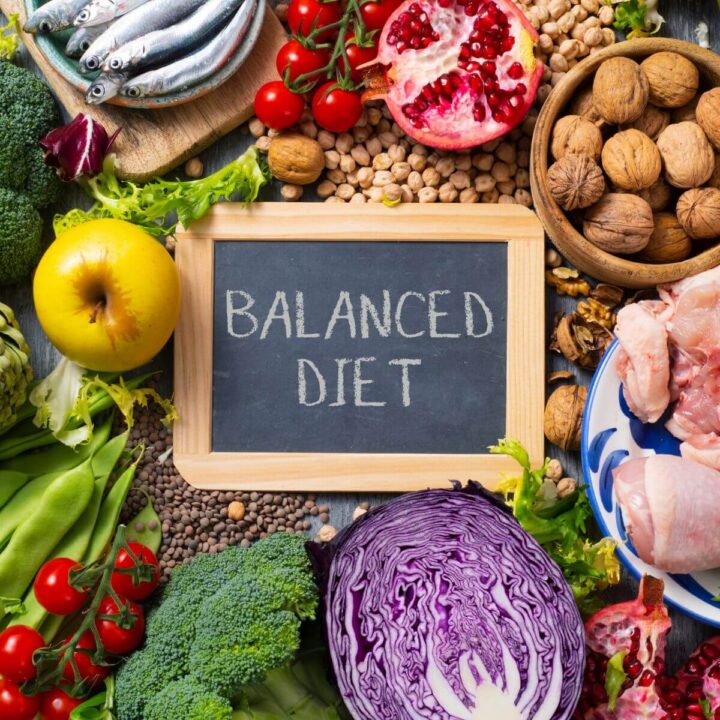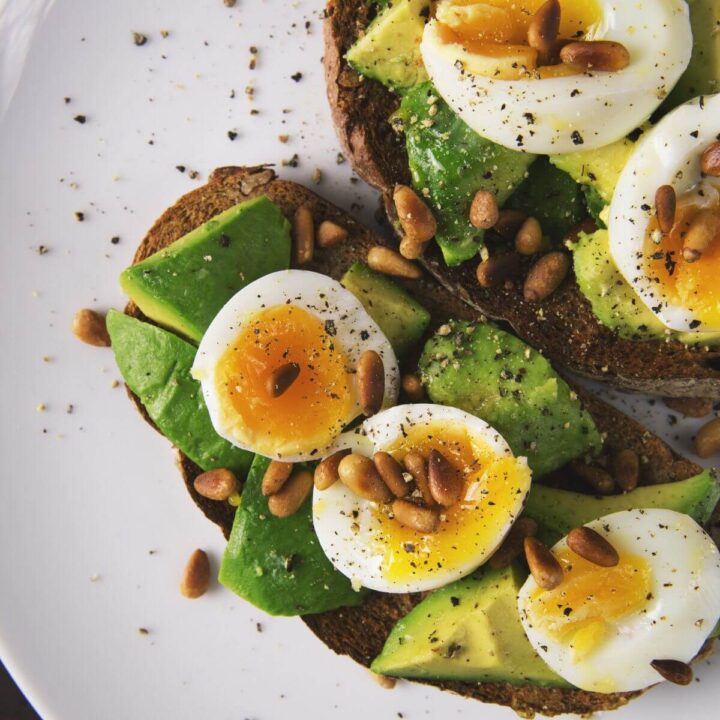Managing weight effectively is a common goal for many, but achieving it sustainably requires more than calorie counting or trendy diets. A holistic approach to nutrition for weight management emphasizes nourishing the body, supporting the mind, and cultivating long-lasting habits. In this comprehensive guide, we'll explore the principles of balanced eating, the role of macronutrients and micronutrients, and how lifestyle factors like sleep and stress play into maintaining a healthy weight.

Jump To:
⁉️ What Is Weight Management?
Weight management refers to adopting strategies to achieve and maintain a healthy weight over time. It's not about crash diets or extreme calorie deficits but creating a balanced relationship with food, exercise, and self-care.
Why Weight Management Matters?
Maintaining a healthy weight is linked to lower risks of chronic diseases like heart disease, diabetes, and certain cancers. Beyond physical health, it also enhances energy levels, improves sleep quality, and boosts confidence and mental well-being.

𐄷 The Foundation of Nutrition for Weight Management
1. Understanding Energy Balance
The principle of energy balance revolves around the relationship between the calories consumed and those burned. To manage weight, the key is achieving the right energy balance for your body's needs.
- Caloric Surplus - Leads to weight gain.
- Caloric Deficit - Results in weight loss.
- Maintenance Calories - Keeps weight stable.
It's important to note that while energy balance is crucial, the quality of the calories consumed has an equally significant impact.
2. Focus on Nutrient Density
Choosing nutrient-dense foods ensures you're fueling your body with essential vitamins, minerals, and other beneficial compounds while managing calorie intake. Foods like leafy greens, lean proteins, whole grains, nuts, and seeds are examples of nutrient-dense options.
Top Nutrient-Dense Foods for Weight Management
- Spinach - High in fiber and low in calories.
- Salmon - Rich in omega-3 fatty acids and protein.
- Quinoa - A complete protein and source of complex carbohydrates.
- Berries - Packed with antioxidants and natural sweetness.
🧑🔬 The Role of Macronutrients
Balancing macronutrients; carbohydrates, proteins, and fats; is a cornerstone of nutrition for weight management.
- Proteins - Promote satiety and preserve lean muscle mass.
Examples - Chicken breast, tofu, Greek yogurt. - Carbohydrates - Provide energy. Focus on complex carbs with high fiber content.
Examples - Brown rice, sweet potatoes, oats. - Fats - Essential for hormone production and overall health. Choose healthy fats in moderation.
Examples: Avocado, olive oil, nuts.
Recommended Macronutrient Ratio:
The ideal ratio varies based on individual needs, but a balanced plate often looks like:
- 40-50% carbohydrates
- 25-30% protein
- 20-30% fats
🗝️ The Importance of Micronutrients
While macronutrients get much attention, micronutrients play a silent but essential role in weight management.
- Magnesium - Supports energy production and metabolism.
Sources - Almonds, spinach, dark chocolate. - Vitamin D - Regulates fat storage and muscle function.
Sources - Fatty fish, fortified foods, sunlight. - Zinc - Helps regulate appetite and boost metabolism.
Sources - Pumpkin seeds, chickpeas, beef.
Incorporating a variety of colorful foods ensures a diverse micronutrient profile.

💪 Habits for Sustainable Weight Management
1. Mindful Eating
Mindful eating involves paying attention to the sensory experience of eating and recognizing hunger and fullness cues. This mindful eating practice can prevent overeating and build a healthy relationship with food.
Tips for Mindful Eating:
- Chew thoroughly and eat slowly.
- Avoid distractions like screens while eating.
- Serve meals on smaller plates for portion control.
2. Hydration and Weight Management
Water is crucial for metabolism, digestion, and appetite regulation. Often, thirst can be mistaken for hunger, leading to unnecessary calorie intake.
Hydration Tips:
- Aim for at least 8-10 cups of water daily.
- Start meals with a glass of water.
- Include water-rich foods like cucumbers, oranges, and watermelon.
3. Meal Timing and Frequency
Eating at regular intervals can stabilize blood sugar levels, prevent excessive hunger, and support a healthy metabolism.
Suggested Meal Schedule:
- Breakfast - A protein-rich meal within an hour of waking.
- Lunch and Dinner - Balanced meals with a mix of macronutrients.
- Snacks - Choose nutrient-dense options like a handful of nuts or a boiled egg.
4. Sleep and Stress Management
Both sleep and stress significantly impact hormones that regulate hunger and satiety, such as ghrelin and leptin.
📥 GET THIS RECIPE IN YOUR INBOX 📥
Tips for Better Sleep and Stress Control:
- Establish a consistent sleep routine.
- Practice stress-relief activities like yoga, meditation, or journaling.
- Limit caffeine and screen time before bed.
🍽️ Popular Diet Trends for Weight Management: Do They Work?
1. Intermittent Fasting (IF)
This eating pattern alternates between fasting and eating windows, promoting caloric deficit and potentially improved insulin sensitivity.
Pros - May simplify meal planning and support fat loss.
Cons - Not suitable for everyone, especially individuals with a history of disordered eating.
2. Low-Carb and Ketogenic Diets
Focuses on reducing carbohydrate intake and increasing fat consumption to shift the body into fat-burning mode.
Pros - May help reduce appetite and promote quicker fat loss.
Cons - Difficult to sustain long-term. May lead to nutrient deficiencies.
3. Plant-Based Diets
Emphasizes whole, plant-derived foods, which are often nutrient-dense and lower in calories.
Pros - Promotes heart health and supports sustainable weight loss.
Cons - Requires careful planning to meet protein and vitamin B12 needs.

📌 Practical Strategies for Weight Management
1. Meal Prepping for Success
Preparing meals in advance can help control portions, reduce food waste, and minimize reliance on unhealthy convenience foods.
Steps to Effective Meal Prepping:
- Plan meals around seasonal produce and lean proteins.
- Cook in bulk and store in portioned containers.
- Keep healthy snacks, like cut veggies or homemade granola, on hand.
2. Navigating Social Situations
Social events can often disrupt healthy eating habits, but with preparation, you can stay on track.
Tips for Staying Mindful at Social Gatherings:
- Eat a healthy snack before arriving.
- Focus on portion control and prioritize whole foods.
- Allow indulgences in moderation without guilt.
3. Incorporating Movement
Physical activity complements nutrition in weight management by boosting metabolism, enhancing mood, and supporting overall health.
Exercise Recommendations:
- Aim for 150 minutes of moderate-intensity exercise weekly.
- Include strength training to build muscle mass and increase calorie burn.
- Incorporate enjoyable activities like dancing, hiking, or swimming.
🦠 The Gut-Weight Connection
Emerging research suggests that gut health plays a crucial role in weight management. A diverse gut microbiome supports efficient digestion and metabolism.
Gut-Friendly Foods for Weight Management:
- Prebiotic-rich foods like garlic, onions, and bananas.
- Fermented foods like yogurt, kefir, and sauerkraut.
⁉️ FAQs About Nutrition for Weight Management
How Many Meals Should I Eat a Day For Weight Management?
It varies by individual. Some thrive on three balanced meals, while others prefer smaller, more frequent meals.
Can I Lose Weight Without Exercising?
Yes, through a caloric deficit, but combining nutrition with exercise leads to better long-term results.
Are Cheat Meals Okay?
The word "cheat meal" has a negative tone. It's better to shift your mindset to say "occasional indulgences" which has a much more positive tone. Yes, occasional indulgences can help maintain balance and prevent feelings of deprivation.
However, in my programs and plans we focus less about restriction and more on adding in healthier options.

😀 Conclusion: Building a Sustainable Nutrition Plan
Effective weight management is a journey, not a destination. By focusing on balanced nutrition, mindful habits, and a positive mindset, you can create a sustainable and enjoyable approach to achieving your health goals.
Remember, small, consistent changes lead to lasting results. Prioritize whole foods, listen to your body, and seek support from professionals, like holistic nutritionists, when needed.
Ready to take control of your weight with a holistic approach? Start by evaluating your current habits and committing to one positive change today! Let me know in the comments below what your biggest struggle with weight management has been?
You can also connect with me @EatYourNutrition on Instagram. I love seeing your photos. #EatYourNutrition #LauraVillanueva
📖 Additional Resources For Holistic Health and Wellness
Also, consider exploring the following resources for further reading and guidance on better metabolic and weight health.
- Meal Plan - If you need more help with better metabolic health, then you might want a simple recipe guide and meal plan packed with the key to help ditch the bloat and reset the body. So, if your finally ready to reset your eating habits, try this debloat and glow meal plan inside the Debloat & Glow Healthy Eating Guide and Meal Plan.
- Need Extra Support - Join my A Fresh Start Healthy Weight Loss Program. Register here to join the program from a gut and hormone health nutritionist.
- Group Support - Join my Featured Nutrition Challenge. All seasonal nutrition challenges come with a meal plan, recipe guide, grocery shopping list, and a seasonal featured nutrition theme.























Comments
No Comments